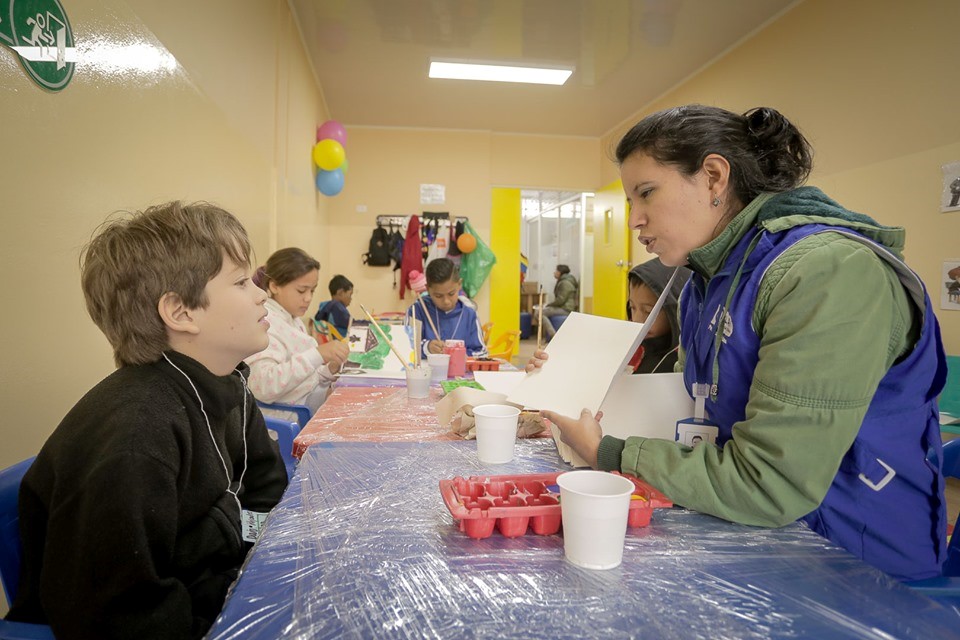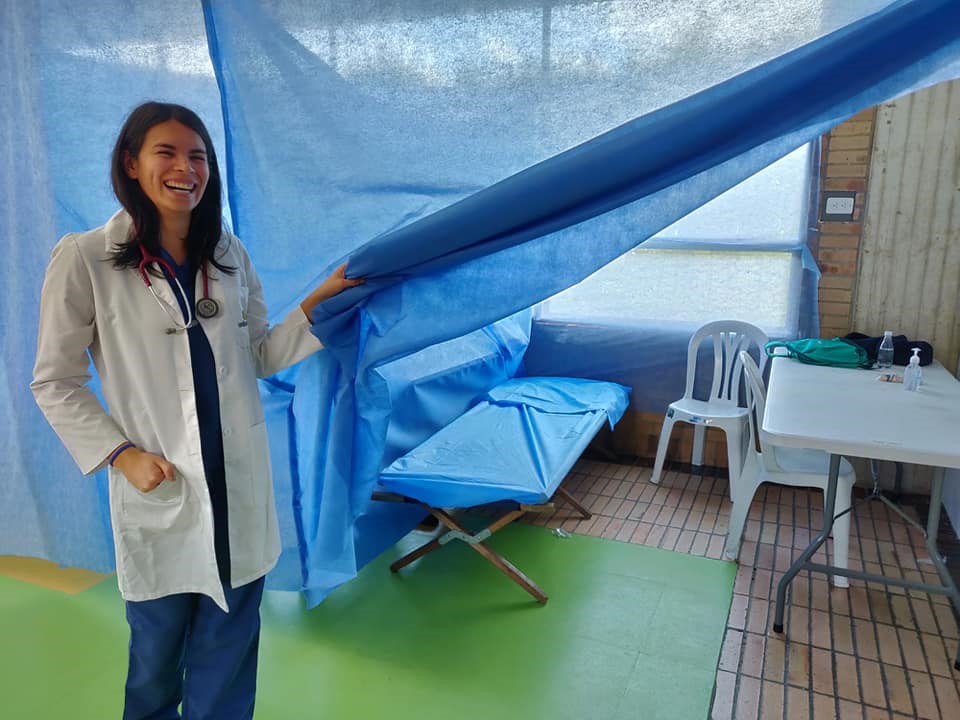Mobile Child Protection in Colombia – Venezuela migration crisis
Mobile Child Protection in Colombia – Venezuela migration crisis

The project in brief
Implemented by
Plan International
Country
Colombia
Duration
The project started in 2019 but there’s an expectation for it to be continued.
Project aims
An integrated mobile approach to protect children and families in urban settings. The integrated child protection mobile programme was an innovative model developed as an additional emergency response to the Venezuela migration crisis coordinated by Plan International Colombia and in partnership with Colombian Red Cross, IOM and involving many other stakeholders to address the challenge of reaching migrant children and families spread across large areas in the district of Bogota.
Resources used
To achieve this, mobile teams were deployed seven times to provide health, nutrition and protection services across Bogota. This complemented an existing static response at the Migrant Centre and the transport terminal in the capital.
Plan International co-led with Colombian Red Cross the design, organisation and implementation of the mobile multi-sectoral response. The local government joined efforts to respond to the humanitarian needs of hundreds of migrant children and families arriving in the city daily.
Mobile child protection services included:
- Identification of the most vulnerable children and referrals including for specialised services on the day and linking to onward services (health, nutrition, education)
- Psychological first aid for all and psychosocial support activities for children up to 12 years
- Information on rights in Colombia and legal orientation
- Group mixed sessions on gender-based violence risk mitigation, and sexual and reproductive rights and service availability
- Direct distribution of age appropriate hygiene kits for all
- Specialised health services for pregnant women, infants and young children including vaccinations
- Dentistry services for children
Main activities of the Good Practice
During the delivery of mobile services for girls, boys and families when additional support is needed they are linked and provided with information of services available at the static centre and contacts. For instance, during one of the mobile response days a 15-year-old from Venezuela out of school was identified, provided with the right information and connected with services to ensure access to education system. The partnership with the Major´s office helps this response to strengthen the way the provided humanitarian assisted to Venezuelans and link up to the existing formal systems. In situation of emergency that requires involvement of hospital or others, our advocacy and their connections helped providing the support needed in a timely manner.
During mobile outreach services some of the services provided by the Major´s office are the provision of information about the static centre, vaccination, a focal point to access formal education and identification of people in need that can benefit from existing public programmes.
Mobile services were attended by hundreds of people and when high priority child protection or health cases were identified a focal point of either Red Cross or Plan take the lead for the appropriate referral according to existing formal systems in Bogota. Coordination and advocacy have helped to ensure appropriate response that would not otherwise be addressed. Follow ups of these cases were provided by personnel working at mobile programme. Sexual violence cases were referred to health professionals that will coordinate with public hospital while child protection cases such as unaccompanied or separated children are referred to CP practitioners that will coordinate with the relevant authority, the Colombian Family Welfare Institute.
Partners
- Colombian Red Cross
- IOM
- Local government in Bogota
- Other NGOs
Plan International coordinated the response and linked together over 11 organisations during the 7 deployments to provide primary health care including a focus on child, infant and maternal health, dentists, linking for child protection and education, NFI distribution, recreational and psychosocial support activities, awareness raising sessions on themes such as child protection, gender-based violence and sexual and reproductive rights and legal assistance. Around 3 days of community mobilisation was conducted in advance of the deployment through Plan International and local government mobile teams and safe registration was done ensuring confidentiality of essential information including protection needs.
A strong coordination and partnership between Plan International and partners, in particular with the Colombian Red Cross, IOM and the Local Government has been crucial in the delivery of most needed services in the most populated areas with affected communities in a timely that links services to reduce duplication.
Challenges and how they were overcome
After the establishment of static services, it became clear that the most vulnerable and hardest to reach were not able to access critical services due to distance, childcare, cost and lack of information.
Therefore, Plan International and partners in Bogota designed and deployed mobile teams to provide easily accessible services in neighbourhoods with high numbers of Venezuelans and needs identified through a city mapping.
Results of the Good Practice
- Mobile protection programming responded to the needs of migrants and refugees from Venezuela and other vulnerable people in Bogota. The mobile services provided a frontline holistic emergency response to ensure that new arrivals and vulnerable populations, especially irregular migrants have information and knowledge about their rights and available services.
- The mobile team focused on protection and health services and deployed 7 times between June and October 2019.
- A total of 18 staff members, 41 volunteers and 40 health personnel were deployed to provide services that reached a total of 3,711 beneficiaries (794 girls, 742 boys, 1,647 women, 528 men).
How the project meets the GCR Objectives
Objective 1: Ease the pressures on host countries
The mobile services started as a response to the need identified by the services to migrants and refugees provided in the static centre in Bogota. This complemented the existing static response at the Migrant Centre and the transport terminal in the capital. The static response provided enough data and evidence to scale up the response with a mobile component. Plan International co-led with Colombian Red Cross the design, organisation and implementation of the mobile multi-sectoral response. In order to identify the hotspots where Venezuelan migrants were living partners collected data at the static services as well as through the Red Cross and iMAPP mapping system.
The local government joined efforts to respond to the humanitarian needs of hundreds of migrant children and families arriving in the city daily. Mobile teams were deployed seven times to provide health, nutrition and protection services across Bogota. Services included legal orientation, psychosocial support activities, Child-Friendly Space for under 12-year olds, distribution of hygiene kits, linking to SRHR clinical services and information among others.
Next steps
- Implement child-friendly feedback mechanisms to ensure accountability to affected children and families.
- Develop and disseminate joint procedures and referral pathways for protection cases during mobile response including guiding documents
- Prioritise needs and targeted response services (i.e. case management, psychosocial support, recreational activities) for adolescent mothers and adolescents that are at-risk of abuse, violence and exploitation.
- Increase the involvement of migrant and refugees from Venezuela and host communities in the activities during service delivery to ensure better acceptance, sustainability and participation.
- Improve prior community mobilisation using local networks, social media platforms and reinforce message of inclusivity of services for children and people in need not only Venezuelans that can lead to discrimination and xenophobia.
- Analyse and connect identification of needs and services with advocacy for temporary or mid-term services.
- Conduct an evaluation and analysis for a continuation of mobile child protection services in Bogota addressing the most urgent needs of girls and boys and considering sustainability and capacity.
Explore more action inspired by the GCR
Submitted by:
Silvia Onate, Deployable Child Protection in Emergencies Specialist






